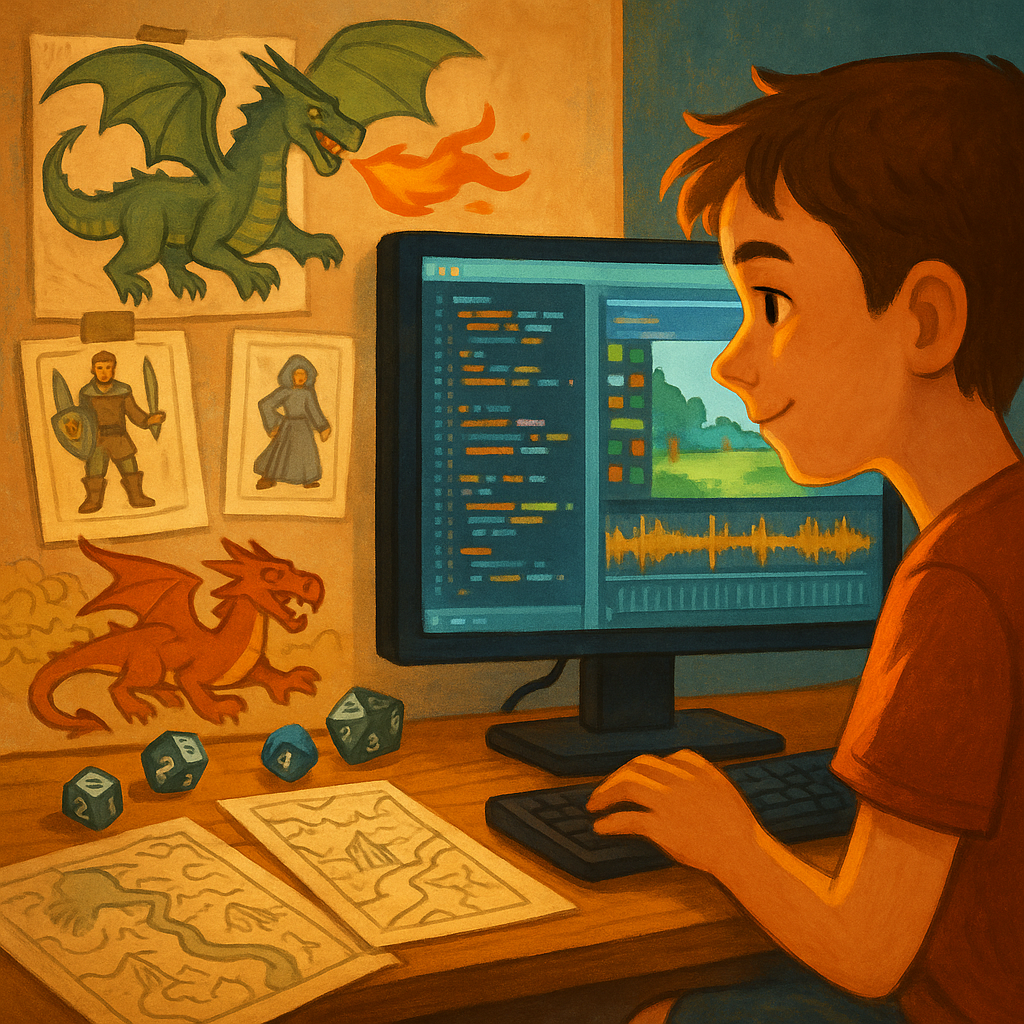How many children truly do something fun and meaningful over their summer break? Beyond the standard sleep-away camps, swimming lessons, and family vacations, summer often becomes a checklist of activities with little lasting impact. And as college application season approaches, the pressure only intensifies - language immersion programs abroad, volunteer trips to build houses, or prestigious internships secured through family connections - all carefully calculated to beautify their profiles rather than nurture genuine growth.
What if we could bridge passion with purpose while letting children learn something meaningful?
A Dragon's Tale
Ethan slouched in his chair, shoulders curved forward, eyes tracing the wood grain on the kitchen table. His parents' voices became background noise as they discussed "productive summer options" for the tenth time that week. Words like "resume-building" and "skill development" floated past him.
Then a phrase cut through his disinterest.
"...combine your fantasy games with coding..."
His head snapped up.
"You mean I could create my own game?" he asked, suddenly alert. His fingertips drummed against the table, already imagining the possibilities.
The transformation was immediate. His parents exchanged glances, surprised by the sudden animation in their son's face after weeks of summer planning discussions that had elicited nothing but groans.
Six weeks later, he hunched over his desk long past midnight, the blue glow of the computer screen illuminating scattered notebooks filled with hastily scrawled character designs and story arcs. Empty soda cans formed a semicircle around his keyboard. He hadn't noticed when his parents had come to check on him, hadn't heard when they'd suggested he get some sleep.
"Just need to fix this one bug," he mumbled, eyes never leaving the screen where lines of code controlled a character's movement through a digital world he'd built himself.
His mother leaned against the doorframe, watching. This wasn't the same boy who had once measured his gaming time in binges, who complained when asked to write a simple essay for school. This boy tracked his hours meticulously, set his own deadlines, researched solutions when he hit roadblocks.
The Alchemy of Design
Behind this transformation was a new approach: a meticulously tailored plan using AI-assisted prompting that unlocked possibilities neither the parents nor traditional educators had considered.
"I want to design a Summer project that marries some of his interest in gaming and fictional fantasy, specifically Dungeon and Dragons, with his potential area of focus in Computer Science," read our initial prompt.
What emerged wasn't a rigid schedule but a living document - a six-week preparation roadmap with carefully structured daily tasks during the project week itself. Each task built naturally upon his interests while stretching him toward new skills. The beauty lay in its flexibility.
When he unexpectedly developed an interest in creating atmospheric music for his game's battle scenes during week three - something not in the original plan - we didn't redirect him back to the schedule. Instead, we quickly adjusted, incorporating a mini-lesson on digital audio production into the following week's plan.
When the boy struggled with a particularly difficult coding concept, spending three frustrated days on what should have been a single afternoon's work, his parents reached out to us, who quickly drafted a revised prompt:
"He's particularly struggling with implementing inventory management in his game. Can we break this down into smaller, more manageable steps with clearer examples?"
The revised approach arrived that evening, and by the next afternoon, he had not only mastered the concept but extended it in ways that surprised everyone involved.
The Moment of Transformation
The transformation doesn't announce itself with fanfare. It happens quietly, when a student realizes they're no longer working for external validation but because they're genuinely absorbed in the process.
For our young game designer, it happened during his third preparation week. His parents found him at his desk, sketching game maps and character stats well past his usual gaming time. When they approached, he didn't look up.
"I figured out how to code the battle mechanics," he said, pencil moving continuously across the page. "It's actually not that different from the algebra we did last semester."
His math textbook lay open beside his notebook, something they'd never witnessed voluntarily before.
Later that week, his computer science teacher received an unexpected email asking about advanced functions not covered in class. The teacher forwarded it to his parents with a note: "Whatever you're doing this summer, keep doing it."
Building Bridges, Not Résumés
The most successful summer projects share common elements:
They begin with genuine passion, articulated through thoughtful prompting that captures the child's true interests rather than adults' assumptions.
They incorporate continuous feedback loops, allowing for real-time adjustments based on the child's actual experience rather than predetermined schedules.
They balance structure with flexibility, providing enough guidance to prevent frustration while allowing enough freedom for authentic discovery.
Most importantly, they prioritize process over product, making learning the reward rather than just another accomplishment to list.
When summer ends and school begins again, these students don't just have a new line for their résumés. They have new ways of thinking, new connections between subjects they love, and a renewed enthusiasm for learning itself. That's the true measure of a summer well spent.
